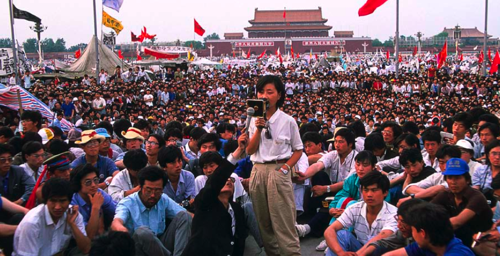One story my father always tells me is about when he was a student protesting during the Tiananmen Square incident. The Tiananmen Square incident took place on June 3rd and 4th, 1989. In this event, the government cracked down on demonstrations taking place in Tianamen Square in Beijing, China. With the end of the eighties, new western, more liberal ideas were coming into the country. The economic growth of the time also allowed for price inflation and corruption in the government, driving people to want economic and political reform. Students were protesting in the square for individual rights and freedoms, surrounding a plaster statue named the "Goddess of Democracy." The protest in Tiananmen Square inspired protests in other cities in China, but the one in Beijing was the most publicized.
The government tolerated these protests for some time, but a shift in Chinese political leaders lead to the decision to attack the protestors. Martial law was declared on Beijing, and army troops dispersed the protesters using force in the forms of opening fire, arrests, and tanks. Dissenters were pursued for weeks after, and the government's response was highly criticized by other countries around the world.
The government's response to this incident was to downplay the incident; they antagonized the protesters and minimized the casualties of the crackdown. This denial of the severity of this incident occurs even today, which brings up the question: should the Chinese government acknowledge the severity of this event, or has the damage taken its toll?
Sources:
https://www.britannica.com/event/Tiananmen-Square-incident
http://www.history.com/this-day-in-history/tiananmen-square-massacre-takes-place
http://www.pbs.org/wgbh/pages/frontline/tankman/cron/


Nice post! This is a very interesting subject because it shows the differences between China and Eastern Europe. They both had the same calls for democracy during this time period, but the Chinese government was able to successfully quash the protests whereas Eastern European countries converted to democracy. What made China able to do what other countries failed in doing? Here's a website to help find out.
ReplyDeletehttps://chinachange.org/2015/06/02/how-the-tiananmen-massacre-changed-china-and-the-world/
Great post! It is interesting to see that this one event in Beijing, sparked protests all throughout the country. This event reminds me of the Solidarity Movement in Poland, but this incident seemed to be a lot more violent. Do you think that the Chinese government made the right decision?
ReplyDeleteFor more information on Solidarity:
https://www.britannica.com/topic/Solidarity
It's always interesting to take a closer look at a demonstration as widely known as that at Tiananmen Square. The fact that a shift in the political climate in China is what broke apart the protesters really speaks to the influence of the governing power in China. Can you think of any other movements that were altered as a result of a change in the government?
ReplyDeleteThis was a great post on something we didn't get to learn too much about in class. Though the incident is not a direct part of American history, it did play a role in our foreign policy. It showed the U.S. how countries around the world were pushing to follow more Western ideals. It's also interesting how you mention the Chinese government's overarching power over the information given to people. There is still an aspect of that today with China's "Great Firewall." This allows the government to control what type of information it citizens can read. For more information, read this article http://abcnews.go.com/Technology/story?id=4707107
ReplyDelete